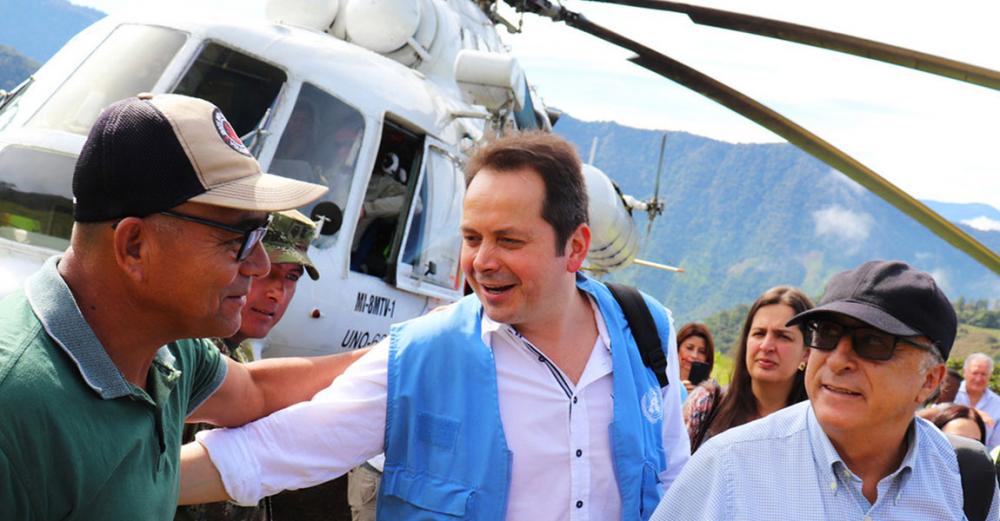Just Earth News | @justearthnews | 14 Jan 2020

New York : Colombia has continued to make “significant strides in its peace process”, the top UN envoy in the country told the Security Council on Monday.
Special Representative Carlos Ruiz Massieu, who also heads the UN Verification Mission in Colombia, pointed out that even in the face of “serious challenges” - particularly in terms of security for conflict-affected communities - greater participation and improved security in last October’s regional elections “demonstrated the positive impact of the peace process on Colombian democracy”.
In November 2016, the Secretary-General welcomed the signing of an historic UN-backed peace agreement between the Colombian Government and the FARC-EP rebels, ending an armed conflict that had been ongoing since 1964.
The UN envoy hailed the “invaluable work” of the Comprehensive System of Truth, Justice, Reparation and Non-Repetition, spelling out that “thousands of former combatants who only a few years ago were armed with weapons of war continue to forge new lives through the opportunities provided by peace, despite many difficulties and security risks”.
He gave credit for these and other achievements to efforts made by the Colombian Government; former FARC-EP rebels; the international community; and social leaders, public officials and many others working every day to consolidate peace.
“I can’t think of a more encouraging example to begin the new year than the image of former adversaries working with a local community to build a bridge together”, the Mission head told the Council.
Long-term reintegration
Introducing “a welcome development” at the end of December, he updated the Chamber that a “reintegration roadmap” had been adopted to establish a framework for a long-term reintegration process.
“Consultations between the Government, particularly the Agency for Reintegration and Normalization, and FARC were key to the finalization of this document, and the Mission is looking forward to supporting the parties in its implementation”, he said.
He added however, that more than 9,000 former combatants living in more remote areas - facing high security risks and obstacles in accessing basic services, education, employment and opportunities - still needed “specific attention” as do over 2,000 children of former combatants.
The UN envoy welcomed 128 “additional accreditations for former combatants” since the Secretary-General’s September report as “a positive first step” and called on the relevant actors to “intensify efforts to resolve the situation of former FARC members whose accreditation remains pending”.
‘Profoundly’ worrying developments
He informed the Chamber that pervasive violence in conflict-affected areas continues to threaten peace and pointed to several “profoundly worrying developments” by outlawed armed groups, namely attacks against community leaders and former combatants.
He maintained that these “hard-won gains must be protected, preserved and built upon” by comprehensively implementing the Peace Agreement.“Peace will not be fully achieved if the brave voices of social leaders continue to be silenced through violence and if former combatants who laid down their weapons and are committed to their reintegration continue to be killed”, stressed the Special Representative.
Citing Cauca, Chocó and Nariño as “epicentres” of violence, he flagged that “rural areas affected by a limited State presence and persistent poverty, and where illegal armed groups and criminal structures continue victimizing populations, especially ethnic communities, to control illicit economies” continued to be a chronic issue.
Lauding the Peace Agreement’s creation of a crop substitution programme to support families transitioning away from coca cultivation, for cocaine manufacturing, he said it was just one of its “far-sighted provisions” to address “a multitude of challenges that have afflicted Colombia for decades”.
“We remain convinced that the full implementation of the Peace Agreement, in all its interconnected aspects, provides the best possible hope for Colombia to lay the foundations for a more peaceful and prosperous future”, he concluded, underscoring that the Security Council’s support “will remain key”.
Photo caption and credit:
UN Verification Mission in Colombia
The Head of the United Nations Verification Mission in Colombia, Carlos Ruiz Massieu (centre), greets an ex-combatant on a field mission to Antioquia in the South American country.